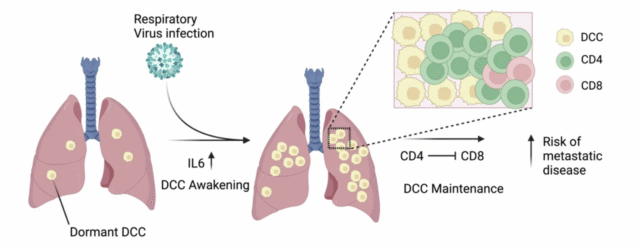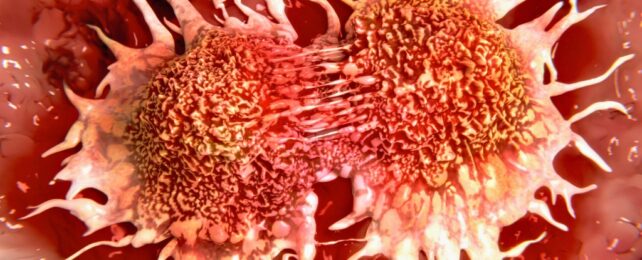Breast cancer patients who have been in remission for years or even decades may still need to be cautious about respiratory infections.
Some common viruses may re-awaken a very small number of dormant breast cancer cells within the lungs, according to emerging research.
"Dormant cancer cells are like the embers left in an abandoned campfire, and respiratory viruses are like a strong wind that reignites the flames," argues molecular geneticist James DeGregori from the University of Colorado.
Related: Cancer Threat From Oral HPV Is a Lifelong Risk, But Can Be Prevented
The research began following the COVID-19 pandemic, when DeGregori and his colleagues noticed a curious uptick in cancer cases.
To find out more, the international team turned to human population studies and mouse models.
They found that patients in remission for cancer in the UK Biobank who tested positive for SARS-CoV-2 later showed a twofold increase in cancer-related death.
"The extent of this increased risk is almost unheard of in epidemiology for cancer," says epidemiologist Roel Vermeulen from Utrecht University in The Netherlands.
"It's a significant effect."
That's not all researchers found, either. Analyzing a separate breast cancer database from the United States, including nearly 37,000 patients, they discovered that a previous SARS-CoV-2 infection was associated with a greater than 40 percent increased risk of metastatic breast cancer in the lungs.
Studies in mice suggest that viruses might be behind the spread.
Influenza and SARS-CoV-2 infections triggered dormant breast cancer cells to proliferate in mice after only days of infection.
Within two weeks, there was "a massive expansion of carcinoma cells into metastatic lesions" by more than 100-fold, write the authors, led by molecular geneticist Shi Chia from the University of Colorado.
"Although species differences warrant caution in interpreting mouse data… collectively, these findings underscore the substantial metastatic risk COVID-19 posed to cancer survivors," warn the team.

For years now, scientists have suspected that some highly common viruses, like the Epstein-Barr Virus (EBV), have the potential to trigger certain cancers.
The human papillomavirus (HPV) is already known to do this. That's why the HPV vaccine has proved so life-changing for millions. It prevents deadly, viral-associated diseases, like cervical cancer.
Since 1936, scientists have been searching for a virus that triggers breast cancer in a similar way, mostly in mice and human population studies.
High-risk viruses have been detected in human breast cancer samples. EBV, for instance, is five times higher in breast cancer tissue than in normal tissue.
But while the idea that viruses may predispose us to cancer is plausible, research in human cells is limited, and the mechanism underlying the disease spread remains undetermined.
The immune system's response to viruses could possibly play a role.

After initial remission, a tiny number of breast cancer cells can remain dormant in lung, bone, and liver tissue.
Sometimes, inflammation can wake these cancer cells up – and viral respiratory infections, like the flu and COVID-19, can cause inflammation.
In the current mouse experiments, the influenza A virus only reawakened dormant cancer cells in the lung if they triggered an increase in inflammatory cytokines, such as IL-6.
The same was true of the coronavirus.
The findings suggest that the immune system's response to viruses breeds the perfect environment for cancer to proliferate.
"What our data suggest is that if you are a cancer patient who has these dormant cells, you may end up living a normal life and dying with these dormant cells, instead of dying because those dormant cells awakened," says DeGregori.
"But if you get a respiratory virus like influenza or COVID, your chance of dying from those dormant cells awakening is much greater."
If that's true, then it will be vital to protect the millions of breast cancer survivors out there who may face an increased risk of relapse if they get sick.
Further research is needed to see if vaccination against influenza or COVID-19 can help.
The study was published in Nature.
